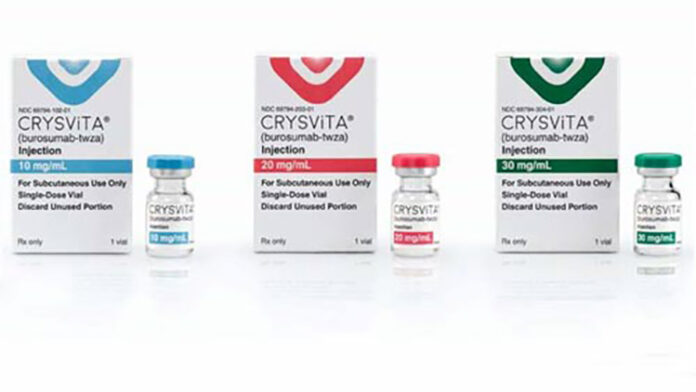TOKYO– Kyowa Kirin Co., Ltd. (TSE:4151, Kyowa Kirin) today announced the publication of new data highlighting the sustained benefits of treatment with CRYSVITA® (burosumab) in adults with X-linked hypophosphataemia (XLH), a rare genetic metabolic bone disease. The data show that adults with XLH experience substantial pain, stiffness, fatigue and impairment in physical and ambulatory function. Treatment with CRYSVITA was associated with a significant improvement from baseline after 96 weeks.1
The data are from a randomised, double-blind, placebo-controlled, phase 3 study with an open-label extension to assess the efficacy and safety of CRYSVITA in adults with XLH.2 The study met its primary endpoint, showing a statistically significant effect in increasing serum phosphorus concentrations at 24 weeks, compared to placebo.3 After 24 weeks, all patients were switched to CRYSVITA treatment and data was collected on metabolic and biochemical markers, patient reported outcomes (PROs) and measures of mobility up to 96 weeks. This new publication focuses on the results from the PRO analysis and mobility scores.1
At week 96, the study showed statistically significant improvements in PROs, including the Western Ontario and the McMaster Universities Osteoarthritis Index (WOMAC), Brief Pain Inventory–Short Form (BPI-SF) and Brief Fatigue Inventory (BFI), compared to baseline.1 Statistically significant improvements in ambulatory function, measured by the 6-minute walk test (6MWT), were also seen at 96 weeks compared to baseline.1 Data previously published at 48 weeks also showed improvements in some PROs, including stiffness and pain, as well as fracture healing.3
Lead author Pr Karine Briot, Hôpital Cochin, Paris, France said: “The study highlights the many physical challenges faced by adult patients with XLH, including pain, stiffness, fatigue and difficulty walking or physical function. Burosumab treatment has previously been shown to improve phosphate homeostasis in adult XLH patients, compared to placebo. This new analysis suggests that, despite the long-term complications and physical impairment associated with XLH in adults, treatment with burosumab can also improve the physical function and quality of life of adults with XLH over the longer term.”
Tomohiro Sudo, Executive Officer, Head of Global Product Strategy Department of Kyowa Kirin, said: “Kyowa Kirin is committed to improving the lives of people with XLH and their families. One of our areas of focus is to generate new data that improve our understanding of how best to manage and treat XLH. These important new data highlight the many physical challenges that people living with XLH face every day, how their needs could be better met and how Kyowa Kirin is delivering on its purpose, to make people smile.”






